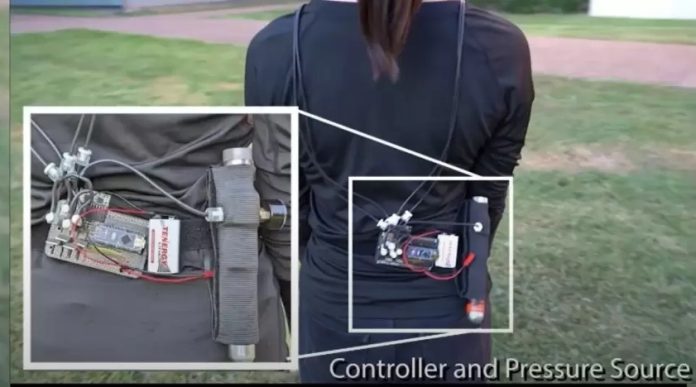
Imagine a piece of clothing that can gently tap you on the wrist and tell you where to go! Sounds futuristic, right? Well, that’s what scientists at Rice University have created.
It’s a unique wearable device made from fabric. Instead of using heavy electronic parts, it uses air to give a soft tap on your wrist.
This tap helps guide the wearer in the right direction. The best part? It’s lightweight and easy to wear, just like your favorite t-shirt!
The smart folks at Rice University designed this device to use something called “haptics”. Now, you might be wondering, what’s that? Haptics is all about touch.
For example, when you feel something hot, cold, or a slight push on your skin, that’s haptics at work. Most devices these days use sound or light to give signals, but haptics is all about feeling.
The team’s goal was to make a device that wasn’t heavy or uncomfortable. Traditional devices which use touch signals are often bulky, but this new wearable is different. It’s made of special textiles (or fabric materials) that allow it to be light and easy to wear on the arm.
To see if their creation worked, the researchers ran some tests.
First, they tested it in a lab setting with people wearing the device. The results were impressive! On average, 87% of the time, users understood which direction the wrist-tapper was telling them to go.
After that, the team took the experiment outside. They added two of these fabric sleeves to a shirt and added some extra parts on a belt to make everything portable.
Then, they asked people wearing this special outfit to walk a distance of one kilometer, just by following the taps on their wrists. There was also another test where people rode electric scooters on different types of roads.
In both tests, the device performed really well. If you’re curious to see how it looked in action, there’s even a video of these tests!
This device isn’t just cool; it can be super helpful for many people. Think of those who use artificial arms or legs.
Or people who have trouble hearing. Even professionals like pilots, surgeons, and soldiers who have to deal with lots of visual and sound signals can use a break. For them, a simple tap on the wrist can be a game-changer.
The main person behind this project, Daniel Preston, who’s a mechanical engineer at Rice, said they’re not stopping here. They want to make the device even better. They’re working on making the taps convey more complex messages, but in a way that’s still easy for the user to understand.
The next time you think of wearables, don’t just think of watches or headphones. The future might just be in simple shirts that can guide you with a gentle tap.
Thanks to the hardworking team at Rice University, that future isn’t too far away!
Follow us on Twitter for more articles about this topic.



